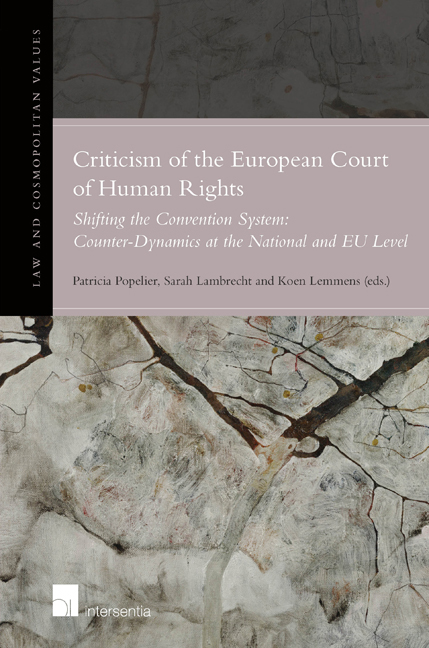 Criticism of the European Court of Human Rights
Criticism of the European Court of Human Rights from PART II - SPARSE CRITICISM
Published online by Cambridge University Press: 13 December 2017
CRITICISM OF THE EUROPEAN COURT OF HUMAN RIGHTS
While, in recent years, critical debates on the position and the case law of the European Court of Human Rights arose in neighbouring countries, this has not been the case in Belgium (A). The influence of both the European Convention of Human Rights (ECHR) and the case law of the European Court of Human Rights (ECtHR) has nonetheless been substantial. Both courts and politicians have been eager to comply with the ECtHR's jurisprudence, which is based on an overall respect for the Convention system and the Court. Meanwhile, however, a growing sense of irritation comes to the surface (B).
RESPECT FOR THE CONVENTION SYSTEM IS SHARED AT ALL LEVELS…
At the base-line a commonly shared confidence in the Convention system can be discerned, at the political as well as the judicial and doctrinal level and at the level of the media.
Marc Bossuyt describes criticising Strasbourg case law as a ‘taboo’. This is overstating the fact, as authors do criticise individual judgments. Nevertheless, doctrine, generally, is favourable of the ECtHR, to the point that Koen Lemmens threw himself into the breach for the Strasbourg Court, by taking a broader and dynamic perspective to the Court's case law, instead of focusing on very specific cases.
The courts, in turn, display an extremely Europe-friendly attitude, as will be made clear in part III. The ECHR as well as the ECtHR take a prominent position in particular in the jurisprudence of the Constitutional Court, but other courts as well, as a rule, feel little hesitation to comply. In literature, this is identified as an important indicator for measuring the extent to which the ECtHR is considered a legitimate court. Courts can take this Europe- and Strasbourgfriendly attitude because they can rely on public support for the Convention system. The credibility and legitimacy of the ECtHR is generally not put to doubt at the political level or in public opinion. In this, political attitude and media interests reinforce each other. In general, both MP's and the media have adopted an unquestioning attitude towards the ECtHR. Only occasionally were critical opinions picked up by (Flemish) media.
To save this book to your Kindle, first ensure [email protected] is added to your Approved Personal Document E-mail List under your Personal Document Settings on the Manage Your Content and Devices page of your Amazon account. Then enter the ‘name’ part of your Kindle email address below. Find out more about saving to your Kindle.
Note you can select to save to either the @free.kindle.com or @kindle.com variations. ‘@free.kindle.com’ emails are free but can only be saved to your device when it is connected to wi-fi. ‘@kindle.com’ emails can be delivered even when you are not connected to wi-fi, but note that service fees apply.
Find out more about the Kindle Personal Document Service.
To save content items to your account, please confirm that you agree to abide by our usage policies. If this is the first time you use this feature, you will be asked to authorise Cambridge Core to connect with your account. Find out more about saving content to Dropbox.
To save content items to your account, please confirm that you agree to abide by our usage policies. If this is the first time you use this feature, you will be asked to authorise Cambridge Core to connect with your account. Find out more about saving content to Google Drive.